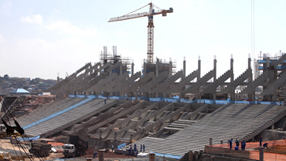
The bad news is that they are already three times over budget and are being built with taxpayers' money despite initial promises that private enterprise would foot the bill.
Although all the stadiums should be ready for the kick-off in 26 months' time, with sports minister Aldo Rebelo saying that some will be ready by the end of this year, there will be a heavy price for Brazil's beleaguered taxpayers to pay.
The stadiums are much more expensive than similar arenas built elsewhere and at least four of them, and perhaps as many as eight, will be white elephants, unlikely ever to turn a profit.
"I don't understand why a stadium in Brazil needs to cost 500 million reais ($275 million) when there are examples of stadiums built elsewhere in the world with 40,000 or 50,000 seats that cost less than half that," said Amir Somoggi, Sports Management Consulting Director at BDO Brazil, an auditing firm.
The ballooning price tag of the World Cup preparations is yet another example of the "Brazil cost", an exasperating mix of high taxes, stifling bureaucracy and crumbling infrastructure that make Brazil a notoriously expensive and difficult place to do business.
Those elements are perhaps most evident at Itaquera (pictured) in Sao Paulo, where Brazilian construction giant Odebrecht is building a brand new arena to host the prestigious opening match.
The stadium, which will belong to Sao Paulo's biggest club Corinthians once the tournament is over, will seat 48,000 fans and cost at least 820 million reais ($450.5 million).
The best features, fun and footballing quizzes, straight to your inbox every week.
But that doesn't include the construction and removal of the 20,000 additional seats that FIFA, football's governing body, requires for the opening game.
Odebrecht and Corinthians officials still do not know how much the temporary seating will cost.
"Our contract is to build a 48,000-seat stadium and prepare the ground for the additional seating," said Frederico Barbosa, the engineer in charge of the project. "The cost of that is still being discussed."
There are other issues surrounding Itaquera, as with most World Cup grounds. It is far from the city centre and the road links and surrounding infrastructure are poor.
The design also has its detractors. Although it is one of the most expensive of the 12 venues, areas behind the goals are uncovered, a problem in a country with torrential rains and blistering heat.
And it is one of only two not to seek certification by the Green Building Council, according to GBC officials in Brazil.
But it does have nearby rail and metro links, unlike many of the other stadiums for the Cup, and construction is on time.
"We've been surprised how well things have gone, to get this far after just nine months is great," said Barbosa.
CORINTHIANS VS SAO PAULO
The opening match was supposed to take place at Morumbi, the 73,000-seat stadium owned by Sao Paulo FC, arch-rivals of Corinthians.
Sao Paulo drew up plans to modernize the ground but FIF
 Join The Club
Join The Club





